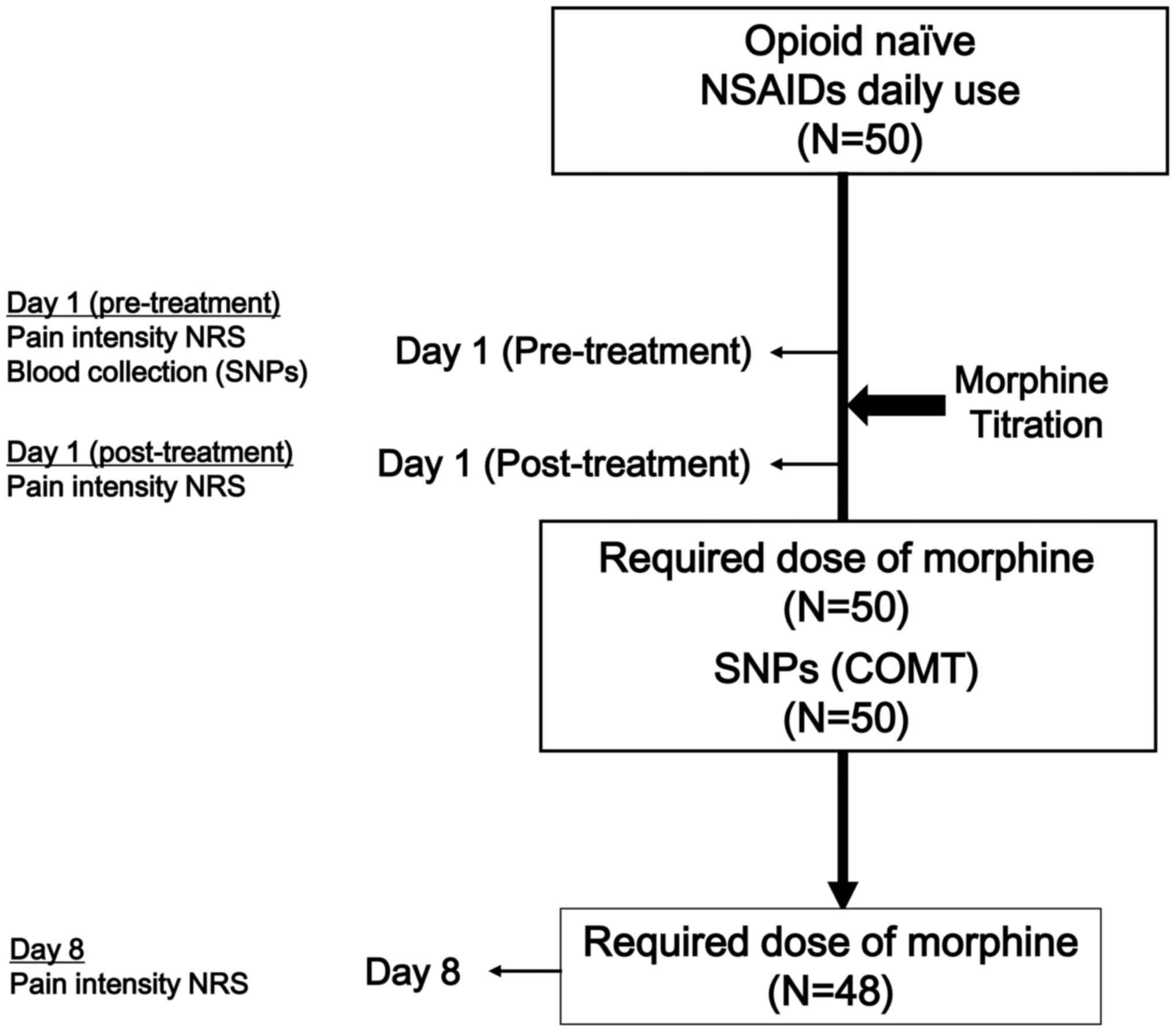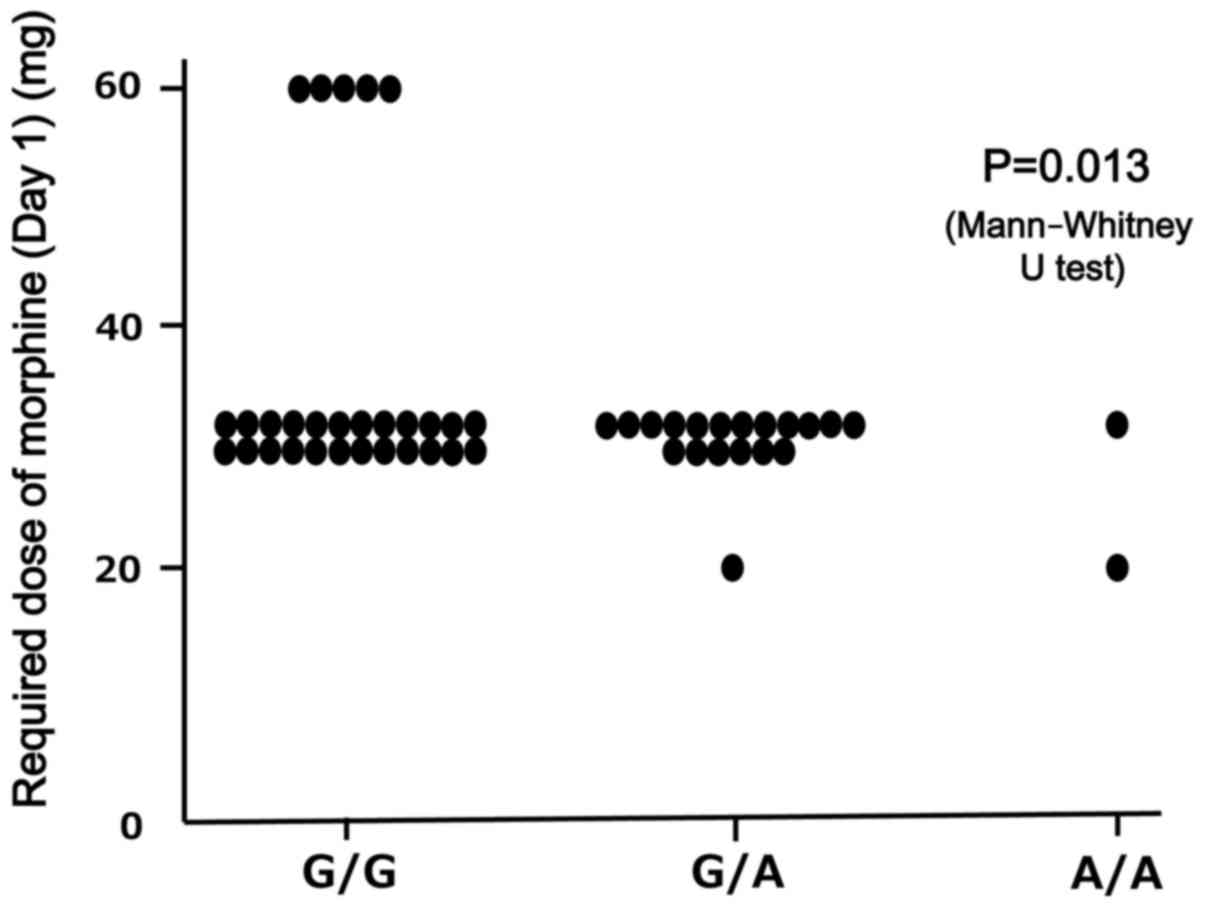|
1
|
Cleeland CS: Undertreatment of cancer pain
in elderly patients. JAMA. 279:1914–1915. 1998. View Article : Google Scholar : PubMed/NCBI
|
|
2
|
Patrick DL, Ferketich SL, Frame PS, Harris
JJ, Hendricks CB, Levin B, Link MP, Lustig C, McLaughlin J, Reid
LD, et al: National Institutes of Health State-of-the-Science
Panel: National Institutes of Health State-of-the-Science
Conference Statement: Symptom management in cancer: pain,
depression, and fatigue. July;15–17. 2002.J Natl Cancer Inst
Monogr. 32:9–16, 2004.
|
|
3
|
Potter J and Higginson IJ: Pain
experienced by lung cancer patients: A review of prevalence, causes
and pathophysiology. Lung Cancer. 43:247–257. 2004. View Article : Google Scholar : PubMed/NCBI
|
|
4
|
Butler LD, Koopman C, Cordova MJ, Garlan
RW, DiMiceli S and Spiegel D: Psychological distress and pain
significantly increase before death in metastatic breast cancer
patients. Psychosom Med. 65:416–426. 2003. View Article : Google Scholar : PubMed/NCBI
|
|
5
|
Bischoff K, Weinberg V and Rabow MW:
Palliative and oncologic co-management: Symptom management for
outpatients with cancer. Support Care Cancer. 21:3031–3037. 2013.
View Article : Google Scholar : PubMed/NCBI
|
|
6
|
Chase DM, Huang HQ, Wenzel L, Cella D,
McQuellon R, Long HJ, Moore DH and Monk BJ: Quality of life and
survival in advanced cervical cancer: A Gynecologic Oncology Group
study. Gynecol Oncol. 125:315–319. 2012. View Article : Google Scholar : PubMed/NCBI
|
|
7
|
Kelsen DP, Portenoy RK, Thaler HT,
Niedzwiecki D, Passik SD, Tao Y, Banks W, Brennan MF and Foley KM:
Pain and depression in patients with newly diagnosed pancreas
cancer. J Clin Oncol. 13:748–755. 1995. View Article : Google Scholar : PubMed/NCBI
|
|
8
|
Turk DC, Sist TC, Okifuji A, Miner MF,
Florio G, Harrison P, Massey J, Lema ML and Zevon MA: Adaptation to
metastatic cancer pain, regional/local cancer pain and non-cancer
pain: Role of psychological and behavioral factors. Pain.
74:247–256. 1998. View Article : Google Scholar : PubMed/NCBI
|
|
9
|
Lötsch J, Geisslinger G and Tegeder I:
Genetic modulation of the pharmacological treatment of pain.
Pharmacol Ther. 124:168–184. 2009. View Article : Google Scholar : PubMed/NCBI
|
|
10
|
Bell GC, Donovan KA and McLeod HL:
Clinical implications of opioid pharmacogenomics in patients with
cancer. Cancer Control. 22:426–432. 2015.PubMed/NCBI
|
|
11
|
Rakvåg TT, Klepstad P, Baar C, Kvam TM,
Dale O, Kaasa S, Krokan HE and Skorpen F: The Val158Met
polymorphism of the human catechol-O-methyltransferase
(COMT) gene may influence morphine requirements in cancer
pain patients. Pain. 116:73–78. 2005. View Article : Google Scholar : PubMed/NCBI
|
|
12
|
Rakvåg TT, Ross JR, Sato H, Skorpen F,
Kaasa S and Klepstad P: Genetic variation in the
catechol-O-methyltransferase (COMT) gene and morphine
requirements in cancer patients with pain. Mol Pain. 4:642008.
View Article : Google Scholar : PubMed/NCBI
|
|
13
|
Reyes-Gibby CC, Shete S, Rakvåg T, Bhat
SV, Skorpen F, Bruera E, Kaasa S and Klepstad P: Exploring joint
effects of genes and the clinical efficacy of morphine for cancer
pain: OPRM1 and COMT gene. Pain. 130:25–30. 2007. View Article : Google Scholar : PubMed/NCBI
|
|
14
|
Candiotti KA, Yang Z, Buric D, Arheart K,
Zhang Y, Rodriguez Y, Gitlin MC, Carvalho E, Jaraba I and Wang L:
Catechol-o-methyltransferase polymorphisms predict opioid
consumption in postoperative pain. Anesth Analg. 119:1194–1200.
2014. View Article : Google Scholar : PubMed/NCBI
|
|
15
|
Klepstad P, Fladvad T, Skorpen F, Bjordal
K, Caraceni A, Dale O, Davies A, Kloke M, Lundström S, Maltoni M,
et al: European Association for Palliative Care Research Network:
Influence from genetic variability on opioid use for cancer pain: A
European genetic association study of 2294 cancer pain patients.
Pain. 152:1139–1145. 2011. View Article : Google Scholar : PubMed/NCBI
|
|
16
|
Atkinson TM, Mendoza TR, Sit L, Passik S,
Scher HI, Cleeland C and Basch E: The Brief Pain Inventory and its
‘pain at its worst in the last 24 hours’ item: Clinical trial
endpoint considerations. Pain Med. 11:337–346. 2010. View Article : Google Scholar : PubMed/NCBI
|
|
17
|
Matsuoka H, Arao T, Makimura C, Takeda M,
Kiyota H, Tsurutani J, Fujita Y, Matsumoto K, Kimura H, Otsuka M,
et al: Expression changes in arrestin β 1 and genetic variation in
catechol-O-methyltransferase are biomarkers for the response to
morphine treatment in cancer patients. Oncol Rep. 27:1393–1399.
2012.PubMed/NCBI
|
|
18
|
Oken MM, Creech RH, Tormey DC, Horton J,
Davis TE, McFadden ET and Carbone PP: Toxicity and response
criteria of the Eastern Cooperative Oncology Group. Am J Clin
Oncol. 5:649–655. 1982. View Article : Google Scholar : PubMed/NCBI
|
|
19
|
Swarm R, Abernethy AP, Anghelescu DL,
Benedetti C, Blinderman CD, Boston B, Cleeland C, Coyle N,
Deleon-Casasola OA, Eilers JG, et al: NCCN Adult Cancer Pain: Adult
cancer pain. J Natl Compr Canc Netw. 8:1046–1086. 2010. View Article : Google Scholar : PubMed/NCBI
|
|
20
|
Caraceni A, Cherny N, Fainsinger R, Kaasa
S, Poulain P, Radbruch L and De Conno F: Pain measurement tools and
methods in clinical research in palliative care: Recommendations of
an expert working group of the European Association of Palliative
Care. J Pain Symptom Manage. 23:239–255. 2002. View Article : Google Scholar : PubMed/NCBI
|
|
21
|
National Cancer Institute: Common
Terminology Criteria for Adverse Events (CTCAE) v4.03, . https://evs.nci.nih.gov/ftp1/CTCAE/CTCAE_4.03_2010-06-14_QuickReference_5x7.pdfJune
14–2010
|
|
22
|
Montagna P: Recent advances in the
pharmacogenomics of pain and headache. Neurol Sci. 28 Suppl
2:S208–S212. 2007. View Article : Google Scholar : PubMed/NCBI
|
|
23
|
Farrar JT, Polomano RC, Berlin JA and
Strom BL: A comparison of change in the 0–10 numeric rating scale
to a pain relief scale and global medication performance scale in a
short-term clinical trial of breakthrough pain intensity.
Anesthesiology. 112:1464–1472. 2010. View Article : Google Scholar : PubMed/NCBI
|
|
24
|
Tunbridge EM, Harrison PJ and Weinberger
DR: Catechol-o-methyltransferase, cognition, and psychosis:
Val158Met and beyond. Biol Psychiatry. 60:141–151. 2006.
View Article : Google Scholar : PubMed/NCBI
|
|
25
|
Zubieta JK, Heitzeg MM, Smith YR, Bueller
JA, Xu K, Xu Y, Koeppe RA, Stohler CS and Goldman D: COMT
val158Met genotype affects mu-opioid neurotransmitter
responses to a pain stressor. Science. 299:1240–1243. 2003.
View Article : Google Scholar : PubMed/NCBI
|
|
26
|
Arnold BS, Alpers GW, Süss H, Friedel E,
Kosmützky G, Geier A and Pauli P: Affective pain modulation in
fibromyalgia, somatoform pain disorder, back pain, and healthy
controls. Eur J Pain. 12:329–338. 2008. View Article : Google Scholar : PubMed/NCBI
|
|
27
|
Lee YH, Kim JH and Song GG: Association
between the COMT Val158Met polymorphism and
fibromyalgia susceptibility and fibromyalgia impact questionnaire
score: A meta-analysis. Rheumatol Int. 35:159–166. 2015. View Article : Google Scholar : PubMed/NCBI
|
















